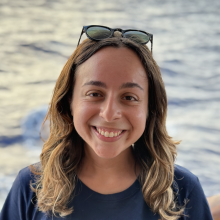
Paola Santiago-Padua
Tell us about your work/research. What kinds of things do you do?
I am a recent graduate of the Universidad de Puerto Rico in Rio Piedras. My background focuses on shallow water coral reef ecology in Puerto Rico, where I am part of the conservation efforts towards their restoration with Sociedad Ambiente Marino. You can find me in the water collecting field observations, maintaining our coral nurseries, and adding coral fragments to the reef. Most days, however, I spend hours on the computer analyzing coral growth and their different predation and restoration practices, taking time to organize outreach initiatives in the community around our studies. Coral ecology never ceases to amaze me, and after exploring deep-sea reef ecosystems, nor have them. My focus now expands into the deep sea, where instead of going into the water, remotely operated vehicle footage is mainly used to gather observations. It allows us to study firsthand these very hard-to-reach ecosystems. I contribute to the team’s efforts by taking real-time observations on the ship that will expand the understanding of these ecosystems and their distribution, helping towards their conservation.
What sparked your initial interest in your career?
I have always admired how science is this universal language that brings us closer to understanding and appreciating nature. When I started out my bachelor’s in biology, I took it upon myself to get involved in as many student organizations toward environmental conservation. Little did I know that after a few SCUBA dives volunteering in coral restoration would change my life completely. I became immersed in the ocean sciences and its conservation, leaving me wanting to know more about what lay beyond my island’s reefs. As an intern for NOAA, I saw for the first time the scientific efforts behind deep sea exploration, and how the better part of it is still waiting to be explored! To this day, the deep sea still amazes me, admiring how science paves the way toward conservation before we risk losing what we are just beginning to understand.
Who influenced you or encouraged you the most?
I have to say my community. Both my parents and fellow peers in coral reef restoration have greatly encouraged me to creatively pursue science as a way to connect with nature and contribute towards the conservation of our island’s resources. They have instilled in me the values I carry on as a scientist, including the perseverance to go follow the unconventional path.
What element of your work/study do you think is the most fascinating?
You never know what awaits! Working with marine ecosystems has brought me the most intimate and close encounters with nature. From seeing and hearing humpback whales while restoring coral reef sites to seeing for the first time long mounts of healthy deep-sea reef ecosystems; it constantly shows me reasons why it’s worth researching to better conserve it.
What other jobs led you to your current career?
I’ve had the privilege of being part of different research teams that have confirmed my passion and decision to contribute to the research efforts around deep-sea ecology. As an undergraduate biologist, I’ve had the opportunity to research coral ecology around different depths, from deep-sea corals and mesophotic reefs to shallow-water coral reefs. From them, I’ve developed a great appreciation and essential skillsets for deep sea exploration, and the value of teamwork and networking in the field. Recently, I’ve been part of the coral restoration efforts in Puerto Rico, where I am from. It has reinforced my decision to further work in marine ecology and given me values I carry on as a scientist to this day, including the value of community outreach. More so, leading their first marine-focused internship in Puerto Rico has given me the passion to continue research along with diversity and community inclusion; values I believe have led me to find fellow like-minded peers and organizations such as the Nautilus team.
What are your degrees and certifications?
Bachelor of Science in Biology - Universidad de Puerto Rico Rio Piedras Campus 2021; Open Water Diving Certification
What are your hobbies?
I like to do yoga, read, and dive into the water anytime I can. I enjoy spending my free time doing digital illustrations and finding ways to apply my creative pursuits toward scientific communication passion projects!
What advice would you give someone who wants to have a career like yours?
You don’t have to choose just one career path in science, it is constantly evolving! And being interdisciplinary will only make you a better scientist, so don’t doubt to follow opportunities where you can learn some skills outside your major. From learning graphic design to basic programming courses, putting myself into experiences outside my comfort zone has been the most rewarding ones, and without a doubt, made me a better scientist in the process.
How did you get involved with the Ocean Exploration Trust?
Applied for the SEIP program after hearing the unique experience of a previous scholar in the program, and later on referred by previous mentors from NOAA.
Expeditions
Paola participated in the following Ocean Exploration Trust expeditions:
